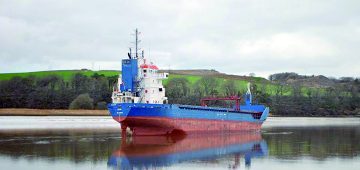Borealis Maritime has acquired the 39,905gt/2013 built and 3,400 TEU capacity sisterships Nordic Beijing and Nordic Hong Kong from Nordic Hamburg Shipping.
CMA CGM has selected Wärtsilä Ballast Water Management Systems (BWMS) for its four new 3,300 TEU container vessels currently under construction. The BWMS system chosen for these vessels is a 500m3 per hour capacity Wärtsilä Aquarius UV system. It uses a simple two-stage process involving filtration and ultra-violet (UV) irradiation. The containerships are being built at the Cosco Zhoushan shipyard in China. Delivery of the equipment to the yard is scheduled to begin in July 2017.
On 1st February Total, the world’s fourth-ranked international oil and gas company, and CMA CGM signed a three-year memorandum of understanding in preparation for stricter fuel regulations in the shipping industry and to further reduce the sector’s footprint by developing solutions that make container ships ever more environmentally- friendly. Total will support CMA CGM by becoming its multi fuel supplier, providing a comprehensive range of solutions as follows: Fuel oil with a sulfur content of 0.5%; Fuel oil with a sulphur content of 3.5% for ships equipped with exhaust gas cleaning systems, or scrubbers, which reduce the polluting emissions before they are released into the atmosphere.
LNG, which offers numerous advantages from an environmental standpoint, including the reduction of CO2 emissions, the elimination of sulfur oxide (SOx) emissions, drastic decrease of nitrogen oxides (NOx) and particulate matters. Total Marine Fuels was also to be renamed Total Marine Fuels Global Solutions on 1st February 2017. The new organisation intends in particular to become a leading player in the LNG bunker market. Total is also very active in marine lubricants, which it markets under the Lubmarine brand.
On 2nd February the CMA CGM Group announced that from the first week of March 2017, its product offering on the Asia-West Africa market will be streamlined from 5 to 4 direct weekly services by adapting the service rotation of the 3 services WAX, WAX 3 and AFEX to West Africa Central Range for an optimised coverage and increased synergies as follows: WAX: Operated by CMA CGM with 12 vessels of 4,350 TEU, will discontinue South Africa and Nigeria calls. Instead, the service will add Abidjan Westbound to its current export call with an improved transit time up to 5 days. Abidjan from Shanghai will be reached in 37 days.

CMA CGM also made its first call to New Orleans on its PEX3 service in early February as part of the Asia-USA service. The New Orleans port call supplements the existing US Gulf calls at Houston and Mobile. From 20th February CMA CGM upgraded its Swahili Express service to twice weekly services with a combined fleet of 9 vessels up to 3,500 TEU with 12 ports of call. The service will be dedicated to the Kenya and Tanzania markets with very fast transit times. Mombasa will be reached from Mundra in 12 days and Dar es Salaam in 14 days. The changes began from the sailing of the 30,024gt/2001 built Chief at Nhava Sheva on 24th February. The Noura Express service will also have an improved transit time to Somalia by 4 days. Mogadishu port will be reached in 7 days from Jebel Ali and in 17 days from Mundra. The upgraded operation began with the sailing of the Keta on 20th February.
COSCO Shipping Holdings has revealed that it disposed of eight containerships with an aggregate tonnage of 409,914dwt over the fourth quarter of 2016. The vessels Luo Ba He (36,722gt/built 1998), 65,140gt/1997 built Jun He, Yue He, Cosco Qingdao, Wan He, Lu He and the 8,917gt/2001 built Cosco Ran and Cosco Sakura were sold off to different independent third-party buyers to be scrapped for a total net consideration of Yuan212m ($30.9m). The Cosco Ran and Cosco Sakura were owned by the group’s subsidiary, Cosco (Cayman) Mercury Co, while the other six vessels were owned by another division, Shanghai Pan Asia Shipping Company. The company had previously scrapped four vessels in April 2016, following the 14 ships dismantled in February and March 2016. The tonnage, totalling 216,900dwt, included two 1993-built container feeders, Xiu He and Ya He, two dry bulkers, the 1998-built capesize Tian Fu Hai and the 1967-built handysize Ming Hai.
Eimskip has confirmed an order for a pair of 2,150-TEU capacity ice-class container vessels from China Shipbuilding Trading Company and Guangzhou Wenchong Shipyard at a price of $64m in total.
The contract is subject to financing and Eimskip is working on securing the funding of the vessels.
The newbuildings, which will be designed in accordance with the Polar Code, are scheduled to be delivered in 2019. Eimskip also reached an agreement with Greenland government-owned Royal Arctic Line (RAL) by which the latter has also signed a contract with the Chinese shipyards to build one vessel of the same type. Both China Shipbuilding Trading Company and Guangzhou Wenchong Shipyard are subsidiaries of China State Shipbuilding Corp. (CSSC). The trio of 180m long/31m beam vessels will have an ice class, will be designed in accordance with the Polar Code and will have a TIER III engine to lower NOx emissions as well as a SOX scrubber. Eimskip has been an agent for Royal Arctic Line since 1993 when the latter was founded. In 2016, the co-operation was extended by appointing TVG-Zimsen, Eimskip’s subsidiary, a forwarder of air-freight and trucking for Royal Arctic Line in Europe.

Sign-up today to read the full article!
Simply click below to sign-up and read the full article, as well as many others, instantly!





Comments
Sorry, comments are closed for this item